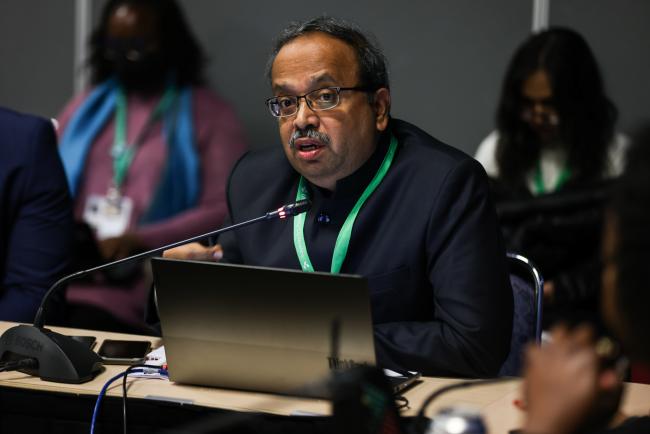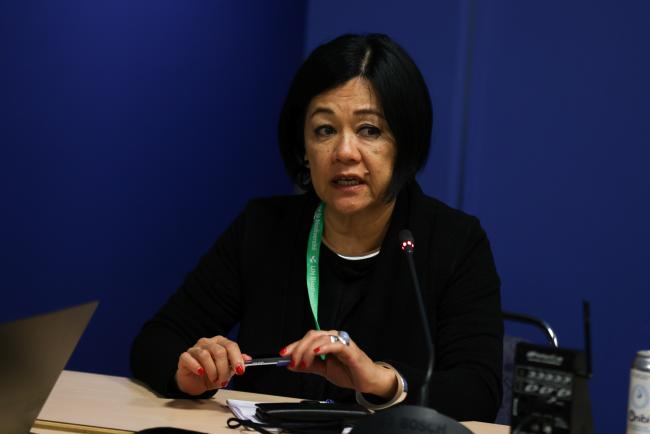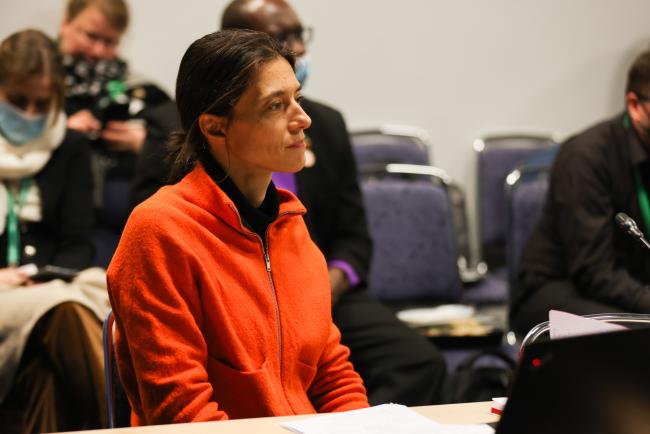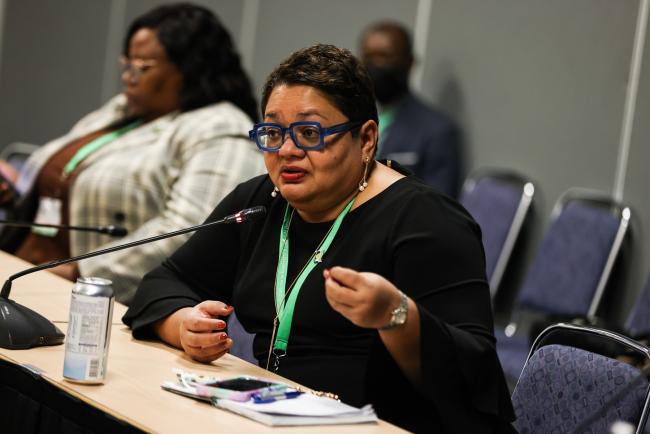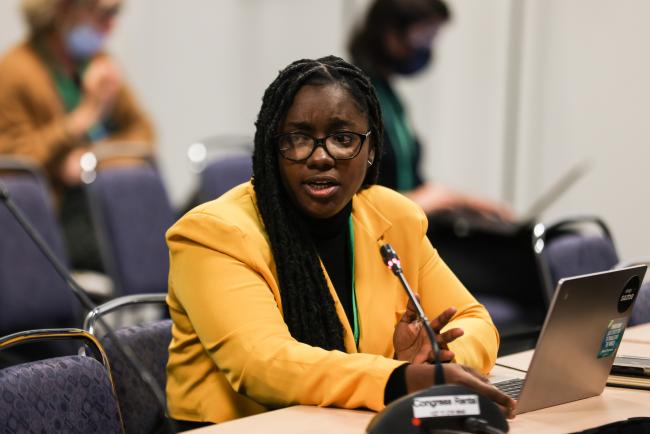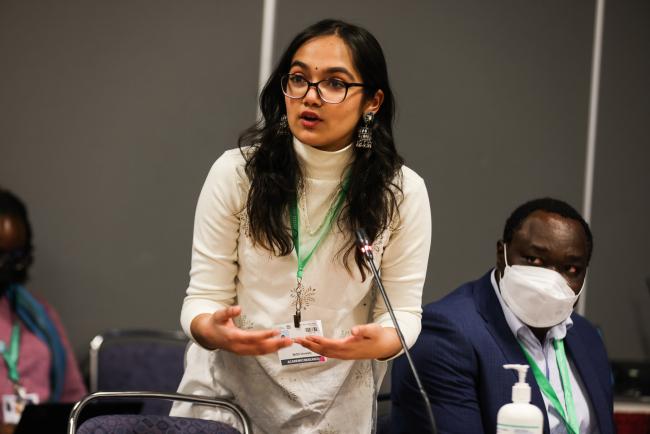About
Given the combined strength of countries from the global South to cooperate and collaborate in securing the future of this Planet, this event discussed opportunities for enhancing inter and intra-regional cooperation to realize the post-2020 global biodiversity framework.
The Organisation of Africa, Caribbean, and Pacific States (OACPS) is currently collaborating with the European Commission, the UN Environment Programme (UNEP), and several international, regional, and national partners to support effective implementation of several multilateral environmental agreements (MEAs), including the Convention on Biological Diversity (CBD).
Given the combined strength of countries from the global South to cooperate and collaborate in securing the future of this Planet, this event discussed opportunities for enhancing inter and intra-regional cooperation to realize the post-2020 global biodiversity framework (GBF). Participants identified approaches and partnerships to support the implementation mandate of COP 15 and consolidated ongoing actions to build the capacity of OACPS member states in implementing the GBF and associated targets.
Balakrishna Pispati, UNEP, moderated this event, noting that the hectic negotiation schedule of the penultimate day of COP 15 prevented many speakers from participating. He said the session’s focus on examining preparations for OACPS to implement the GBF, including through the ACP-MEAs programme.
Cristelle Pratt, Assistant Secretary-General for the Environment and Climate Change, OACPS, highlighted that OACPS countries are custodians of biodiversity, with 39 of the 79 members being “large Ocean states.” She noted that OACPS members are all vulnerable Global South countries on the frontlines of grappling with the impacts of climate change, biodiversity loss, COVID-19, and the global economic crisis, which is stripping away their resilience. She said these countries cannot implement the GBF on their own, highlighting the need for increased capacity development and calling for South-South cooperation to guide next steps in implementing the GBF. She underscored the need to secure other partnerships, including with philanthropists and the private sector, stressing the need to prioritise concessional finance for GBF implementation.
Moderator Pusipati noted that the ACP-MEAs Phase 3 (ACP-MEAs 3) programme focuses on: enhancing capacity to implement biodiversity-related goals; strengthening Ocean governance; and reducing the impacts of agricultural chemicals. He said the programme is looking to engage participants and partners, including the Caribbean Community (CARICOM), the Secretariat of the Pacific Regional Environment Programme, and the African Union Commission, to prepare for GBF implementation.
Calling COP 15 the “biodiversity event of the decade,” Aurelie Godefroy, Directorate-General, International Partnerships, European Commission, cited the EU’s commitment to support partners with means of implementation, noting its pledge of €7 billion in bilateral and regional support for implementing biodiversity-related goals.
Sherry Tross, High Commissioner of Saint Kitts and Nevis to Canada, underlined that this is a pivotal moment for biodiversity, highlighting the unique vulnerabilities of the Caribbean. She pointed to the “ambition of time,” stressing the need to secure actions now “in order to have a future.” Welcoming EU support to CARICOM, he pointed to the 2022 Bridgetown Initiative which highlights that development depends on partnerships, including with international financial institutions. She called for healthy ecosystems and reiterated the Caribbean’s commitment to a strong GBF, prioritizing access to adequate and predictable financial resources for implementation, including for middle-income countries. She also highlighted the need to build metrics into programmes and called for coordination at the national, regional, and international levels, including through biodiversity management committees. In addition, she underscored capacity building and technology transfer for implementation, and communication to understand the content and context of implementation to a wider population.
Amrikha Singh, CARICOM Secretariat, highlighted the vision for CARICOM. She outlined the importance to the region of ensuring food security by 2025, including through climate-smart agriculture and safeguarding coastal and marine ecosystems and genetic resources of plant stocks and seeds. She underscored that nowhere more than in small island developing states (SIDS) do the three Rio Conventions need to be addressed in tandem, underlining the need for integration and coordination for implementation. She said the ACP-MEAs 3 programme produced the Caribbean Biodiversity Strategy, which will be aligned with the GBF, creating resilience and agility in actions in the CARICOM region.
Underlining that youth are not only the future “but are here now,” Bonita Bernard, ACP-MEAs 3 youth representative, said youth have held and facilitated many side events at COP 15, in addition to tracking and lobbying negotiators. She underscored facilitation of youth participation through the Global Youth Biodiversity Network, saying youth are drivers of change and integral to successful GBF implementation. She urged that youth be co-decision makers imploring participants to build more bridges between youth and government, business, civil society, and other parts of the society.
In the ensuing discussion, participants considered the need to involve both urban and rural youth and motivations behind youth action. Others underlined the need to address the disconnect between people and nature. Some stressed the importance of cultural and spiritual links with nature as conservation tools. On novel approaches to GBF implementation, some mentioned the evolution of South-South cooperation and the need to go “beyond a hand-out” to sustainable projects and programmes within a South-South cooperation network. Others pointed to coordinated action on the nexus between the Ocean, biodiversity, and climate.
Some participants called for a more complex discourse on the importance of biodiversity, underscoring that the Global South and the Global North have different priorities but that they must find alignment. They noted that culture and tradition govern links to biodiversity in the Global South while science guides action on biodiversity in the Global North. Others called for the private sector to be less risk-averse on biodiversity investments.
Organizers: OACPS, EU and UNEP
Contact: Balakrishna Pusipati, UNEP Balakrishna.Pispati@unep.org
For more information: https://www.unep.org/cep/multilateral-environmental-agreements-acp-countries-phase-iii-acp-meas-3
Written and edited by Tallash Kantai, Vijay Kolinjivadi, PhD, and Deborah Davenport, PhD.
All ENB photos are free to use with attribution. For this event, please use: Photo by IISD/ENB | Natalia Mroz
To receive free coverage of global environmental events delivered to your inbox, subscribe to the ENB Update newsletter.


